- Home
- Martin Amis
The War Against Cliche: Essays and Reviews 1971-2000 (Vintage International) Page 3
The War Against Cliche: Essays and Reviews 1971-2000 (Vintage International) Read online
Page 3
To the extent that screen violence is technology-led, a specialized value system will tend to assert itself. As in the weapons industry, you will get no moral guidance from the specialist, the salaried expert. What you will get is the explanation ‘Everyone else does it’, because, when up against can-do, don’t-do will always finish second. Still, the prop-shop eggheads at places like Praxis and Visual Concept Engineering, the morphers and animators at Industrial Light & Magic or Dream Quest Images are mere hirelings: somebody has to want that particular splat or spatter, that cute decapitation, that ginchy evisceration. There is this half-formed view of Hollywood as an acropolis of conglomerates, of marketers and targeters, unsmilingly supplying the public with what it has come to want and need: more violence. But it doesn’t work like that. ‘Projects’ swim around the movie community until someone with power gets connected to them. Then they get ‘developed’ by writers, producers and directors, and then get sent upstairs to the ‘suits’ – these supposedly pitiless bottom-liners. But what happens up there remains a mystery to everyone, the suits included. Some projects go ahead, and some don’t. ‘The only films they make’, a director once told me, ‘are the films they can’t get out of making.’ The final decision, then, is the result of fatalism, embarrassment, or inertia – office politics, maybe, but not policy. So violence is director-led, or auteur-led. Films are violent because the talent wants it that way.
Who else does, apart from me? One of the few points that survives the battering of Michael Medved’s beleaguered monograph Hollywood vs. America is that the moviegoing public doesn’t like violence. In his introduction to the paperback edition Medved writes in heroic cadences about ‘the passionate intensity of the public response to my work’; yes, he has taken his share of ‘intemperate anger’ and ‘personal abuse’, but on the whole, says Medved, ‘I am grateful for whatever contribution my arguments have made to facilitating this discussion.’ Certainly, Hollywood vs. America got Hollywood thinking, at least for a weekend or two (late nights in the dens of the Moorish mansions). And it got America thinking, too, and the controversy that gathered around it managed to trickle up as high as Janet Reno and Bill Clinton. It was a book, and a mood, whose time had come: the feeling that Hollywood had gone too far in its divergence from the American mainstream; the feeling that Hollywood loved everything that America hated (violence, sex, swearing, drugging, drinking and smoking), and hated everything that America loved (religion, parents, marriage and monogamy, plus the military, policemen, businessmen and America). Now, I’m sure that Mr Medved seldom, if ever, gets into fights, which is just as well. After three hundred pages of his pedantry and sarcasm, I imagine him tooled up like the loathed Schwarzenegger, and spray-firing from either hip. His argumentative style is so strident that even his own intelligence, you suspect, is cowed and deafened by it. Why oh why, he typically asks, is Hollywood so obsessed by Vietnam and so unmoved by the struggle in Kuwait, which, ‘amazingly enough’, has yet to be celebrated on film? If Dan Quayle were a lot brighter, this is what he would sound like.
Despite its contemporary attire, Medved’s theme, or plaint, is as old as time. It is Ubi sunt? all over again. ‘Where are they now, the great simplicities of yesterday?
In years past, in the heyday of Gary Cooper and Greta Garbo, Jimmy Stewart and Katharine Hepburn, the movie business drew considerable criticism for manufacturing personalities who were larger than life, impossibly noble and appealing individuals who could never exist in the real world. Today, the industry consistently comes up with characters who are smaller than life – less decent, less intelligent, and less likeable than our own friends and neighbors.
Medved’s ‘beat is the entertainment industry’. He knows about the entertainment industry, but does he know about art – about literature, for example, which has been following exactly the same graph line for two thousand years? If art has an arrow, then that is the way it points: straight downwards, from demigod to demirep.
Cinema is a young form, and has been obliged to make this same journey in less than a century. I said earlier that violence got violent in 1966, because that was the year the Hay Production Code was revised, and film edged closer to being a director’s medium, freer to go where the talent pushed it. As we now know, the talent pushed it away from the mainstream of America and towards the mainstream of contemporary art, while playing to its own strengths – action, immediacy, affect. So the great current debate is caught in a confusion of categories. If cinema is just mass entertainment, then Medved is an eloquent awakener. If cinema is art, then Medved is just a noisy philistine.
We now enter a world of closed circles. After 1966, movie audiences halved, and they have stayed halved. Auteurism did more damage to the industry than the arrival of television. Medved, with his polls and his content-analysis, gathers plenty of evidence to confirm what he wants to believe: that Americans don’t like violence – and violent themes and violent language – and won’t pay money to see it. (A final analogy with weaponry: Americans have always been avowedly pro-gun-control but somehow never pro enough to make any difference.) Americans don’t want violence. They probably don’t want art, either. What Americans want is escape – escape from American violence. American violence ‘travels’, it’s said, and enthralls audiences all over the planet, but Americans have to live in America, where all the violence is. Does screen violence provide a window or a mirror? Is it an effect or is it a cause, an encouragement, a facilitation? Fairly representatively, I think, I happen to like screen violence while steadily execrating its real-life counterpart. Moreover, I can tell the difference between the two. One, is happening, one is not. One is earnest, one is play. But we inhabit the postmodern age, an age of mass suggestibility, in which image and reality strangely interact. This is now perhaps the most vulnerable area in the common mind. There is a hole in the credulity layer, and it is getting wider.
In Britain, in recent months, two of the most sensational murder trials of the century have involved discussion of the same rental video; namely, Child’s Play 3. The first case was that of James Bulger, a toddler who was beaten to death by two ten-year-olds; the second case was that of Suzanne Capper, a teenager who was kidnapped, strenuously tortured, and finally set alight by a clique of young acquaintances. Child’s Play 3 has therefore been much in the news, and therefore much in demand. It, too, has been set alight, semi-ritualistically, by public-spirited managers of video-rental stores. When my two children (aged seven and nine) noticed Child’s Play 3 in its package, up on a high self, they regarded it with reverent dread. In their schoolyard voodoo, Child’s Play 3 was considered potent, venomous, toxic. It was like angel dust – a ticket to frenzy.
So one afternoon I duly settled down to watch a routine little horror film about a children’s doll called Chucky that comes to life and starts killing people. The modicum of horror it inspires can be traced back to Freud’s definition of the uncanny: ambiguity about the extent to which something is, or is not, alive. Equally conventionally, such frights and shrieks as the film elicits have to do not with very scary things happening but with mildly scary things happening very suddenly. As the credits rolled on Child’s Play 3, I felt no urge or prompting to go out and kill somebody. And I also knew why. It’s nothing to boast about, but there is too much going on in my head for Chucky to gain sway in there. Probably the worst that Chucky could do to me is to create an appetite to see more Chucky, or more things like Chucky.
What we have to imagine is a mind that, on exposure to Chucky, is already brimful of Chucky and things like Chucky. Then, even if you mix in psychopathology, stupidity, moral deformation, dreams of omnipotence and sadism, and whatever else, Chucky is unlikely to affect anything but the style of your subsequent atrocities. Murderers have to have something to haunt them: they need their internal pandemonium. A century ago, it might have been the Devil. Now it’s Chucky. When the killers tortured Suzanne Capper, they chanted the catchphrase ‘I’m Chucky. Wanna play?’ When the two ten-yea
r-old boys began to throw bricks, James Bulger fell down and stood up again. ‘Just stand there,’ said one of the killers, ‘and we’ll get you a plaster.’ And then he threw another brick. This is Chucky’s way: the worthless joke, the worthless swagger. Here was a mind that had seen a lot of things like Chucky, and had nothing much in prospect but more things like Chucky. Perhaps, also, the child who spoke those words didn’t understand the meaning of earnest. As a result, he was all too ready to play.
New Yorker May 1994
A PM, a President, and a First Lady
The Iron Lady by Hugo Young
Mitterrand thought she had the eyes of Caligula and the mouth of Marilyn Monroe. ‘In her presence,’ said Zbigniew Brzezinski, ‘you pretty quickly forget that she’s a woman. She doesn’t strike me as a very female type.’ In 1979, Tass called her the Iron Lady; but by 1984 Yasser Arafat was calling her the ‘Iron Man’. When an interviewer told Gloria Steinem that the English never believed that they’d ever have a woman prime minister, Steinem replied: ‘They were right.’ So, as the grocer’s daughter stalks around the Kremlin and the White House, as she traumatizes Helmut Schmidt in Luxembourg or wows Lech Walesa in the shipyards of Gdansk, onlookers seem to share the same anxiety: that one day Mrs T. will start heading for the wrong toilet. Hedging his bets, as ever, Ronald Reagan called her ‘one of my favorite people’. And she herself later sought a kind of impersonality in the royal we.
Mrs Thatcher is the only interesting thing about British power politics; and the only interesting thing about Mrs Thatcher is that she isn’t a man. Tricked out with the same achievements, the same style and ‘vision’, a Marvyn or a Marmaduke Thatcher would be as dull as rain, as dull as London traffic, as dull as the phosphorescent prosperity, the boutique squalor of Thatcher’s England (or its southeastern quadrant). A newspaper once cobbled together an item on the ‘sexy’ new voice Mrs T. had aired on a recent radio show. (In fact, of course, she had had a cold at the time.) ‘Margaret,’ said one of her ministers, ‘I read in my paper that you have developed a sexy voice.’ She answered: ‘What makes you think I wasn’t sexy before?’ It is a good question, deserving a sincere and detailed response.* It is also one of perhaps three or four ‘warm’ moments in Hugo Young’s very long, very solid, and unavoidably very gruelling book. British politics just isn’t sexy the way Tehran and Pretoria are, the way Moscow can be, the way Washington always is. Oh, how one yearns, after 546 pages, for the banjos, the majorettes, the misappropriated campaign donations, the sweating vaudevillians of the American scene. Describing a gradient of sullen and insular decline, British politics has long ceased to be sexy. But for the time bring, at least, it does have plenty of gender.
The early years form a tale of almost macabre banality. A Young Conservative is one thing (and not a nice thing), yet Margaret Roberts was a reactionary from the cradle. Her adored dad was a Lincolnshire shopkeeper, an alderman, a justice of the peace, a pale and thrifty busybody. At school, little Maggie was ‘a model pupil of demure habits and tediously impeccable behaviour’; she ran errands for the Tories in the 1935 election, at the age of ten. Having scraped into the subdued, war-torn Oxford of 1943, she studied chemistry, and gained entry into the tweed-lined sanctum of the Conservative Association. There followed two brief careers, one in spectacle-frame plastic, the other in cake fillings. Soon, dashing Denis is motoring through these early pages in his Daimler with its prestige number-plate, DT3. Quite a catch, Denis – his boyish good looks, his ‘weed-killer and sheep-dip’ fortune. Love bloomed at the annual dinner dance of his trade association. Their honeymoon was her first trip abroad. A year after the twins were born she was looking for a parliamentary seat: Orpington, perhaps? But no. ‘Finchley Decides’ is the riveting title of Hugo Young’s third chapter. And thence to the impossible glamour of the Ministry of Pensions.
Around here the tenor of the story changes. Provincial grit and fresh-faced striving now give way to outright historical ascendancy. Or, to put it differently, phenomenal will was allied with phenomenal luck; and the alliance is still holding, after fifteen years. Thatcher’s hot streak reveals itself most brazenly in the absence of any coherent opposition during her decade in power; and it finds its sharpest emblem in the three Argentinian shells which wedged themselves into task-force vessels and failed to explode. Throughout the 1970s there was only one dynamic in British politics, trade-union power, which had brought down – and, it seemed, eternally discredited – both factions of conventional governance. Mrs Thatcher broke the unions by dividing the class they represented. In 1980, unemployment made its largest single-year climb since 1930. And this wasn’t what monetarism and the ‘Chicago revolution’ had in any way predicted. It was a brutal chaos that somehow resolved itself in Mrs Thatcher’s favour. With hindsight, would she now claim feminine intuition? Her first act as Prime Minister, after all, was to create the ten-grand-a-year policeman, who could be trusted to keep the lid on the new underclass, once it started to boil. It started boiling in 1981. When she saw the first footage of the riots and looting, the urban Morlocks in their ecstasy of hatred and despair, Mrs Thatcher responded as follows: ‘Oh, those poor shopkeepers!’
Women! But is she one? Well, yes and no. She has never been afraid to cry in public. Right from her early days at the Ministry of Pensions, if senior officials proved insufficiently right-wing then Mrs T. would avail herself of a refreshing little weep. I once saw her cry on television; I was in a London pub at the time, and was almost knocked off my stool by the ambient roar of foul-mouthed disgust. With her own people she is evidently forceful, fierce, vengeful, hortatory – and always right. ‘You mean to say’, whispered a newcomer to the Cabinet, ‘that you’ve been putting up with this for four years?’ On the other hand she could be recklessly loyal: a strategic hug from a colleague could win lifelong fealty from the melting Leaderene. Above all, her integrity expresses itself in responsibility-taking, in non-delegation. Although she adored Reagan, she was closer to Carter in her love of detail – and closer to Nixon in her resentment of a cultural ‘establishment’ supposedly ranged against her, in her settled philistinism, and in her passion for secrecy.
She has never expressed any admiration for the women’s movement or shown any concern for women’s rights. Far from it. ‘I hate those strident tones we hear from some women’s libbers.’ Something of a bitch in the manger, she seemed to want women, or other women, to stay in their place, to become ever keener on ‘the family’ and its Victorian manifestations. When the Yorkshire Ripper was at his most active, in 1980, Mrs T. told the Home Secretary that she was going to Leeds to take charge of the investigation. This ridiculous proposal was until then her only gesture of female solidarity. When she said we, she was being Queen Victorian. What she meant was I: ‘We are in the fortunate position, in Britain, of being, as it were, the senior person in power.’ Nevertheless, her wardrobe came almost to engulf the Lady MPs’ room in the Commons: ‘There would be half a dozen garments hanging up there and underneath them a tidy row of at least eight pairs of shoes.’ In 1986 she threw her home closet open to the viewing public on a show called The Englishwoman’s Wardrobe. Here, in her innocent volubility, she was all woman. We will never know where Harold Wilson’s Y-fronts come from; but it is a matter of public record that Mrs T. scores her underwear at Marks & Spencer.
It doesn’t sound likely, or even a wise move, but Margaret Thatcher is the first British politician to have embraced the television age. In this area she was always entirely unfastidious. Media valets were hired early on and constantly deferred to. In her first campaign the gawky dowd was there for the photo-op, fondling a new-born calf or whatever else they had her do. After the Falklands War she invited David Chariots of Fire Puttnam and Andrew Evita Lloyd Webber to Chequers at Christmas, in an apparent attempt to coax them into some kind of celebration of her triumph. Her handlers found her femininity helpful; as Young says, a woman is ‘well accustomed to manipulation for cosmetic effect’.
She to
ok speech lessons from an instructor at the National Theatre, and did humming exercises to reduce the famous dentist’s-drill effect of her voice. ‘She achieved a reduction of pitch of 36 Hz.’ The refashioning of Mrs T. (creepily apparent from the photographs included in the biography) is in my view crucial to her aura of near-pathological inauthenticity. The creature on the TV, with martyr’s frown, pitying smile, saccharine tongue – what is she doing, exactly? Hamming, dissembling, dissimulating? Does she buy that tutored serenity?
‘Most families have one like her,’ wrote Ian McGregor, Mrs T.’s Scottish–American unionbuster. ‘She was like my mother – who always had a clear idea of what she wanted to do.’ Yet this mother was never loved by her extended family: never loved. Her first victory was secured despite a nineteen-point deficit in her personal-approval ratings (inconceivable in America). Two years later she was as unpopular as any PM since polling began. Even now public opinion spurns her, and shows a confused and wistful sympathy for all those ‘wet’ notions – consensus, compassion, collectivism – that she so stoutly opposed. Who is this ‘dry’ mother, whom people can’t love, and what kind of children is she rearing? They all feel guilty – this mother can make anyone feel guilty. But they feel guilty in the wrong kind of way. They miss the old kind of guilt. They want an aggregation that points towards something better than ‘acquisitive individualism’. Something better than mere human nature. They don’t want someone who just monitors its workings, with a saintly smile.

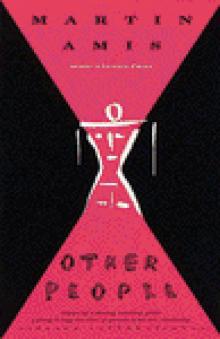 Other People
Other People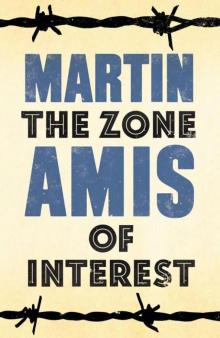 The Zone of Interest
The Zone of Interest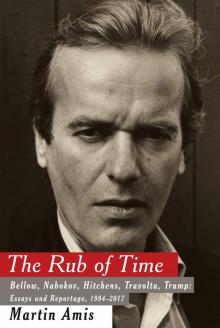 The Rub of Time: Bellow, Nabokov, Hitchens, Travolta, Trump
The Rub of Time: Bellow, Nabokov, Hitchens, Travolta, Trump Koba the Dread
Koba the Dread Success
Success London Fields
London Fields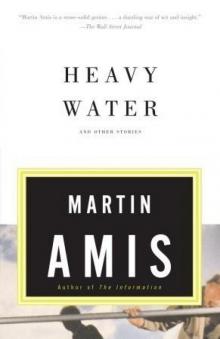 Heavy Water: And Other Stories
Heavy Water: And Other Stories Money
Money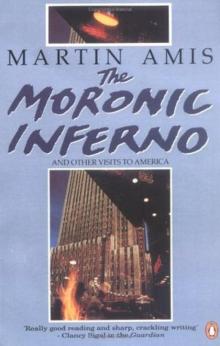 The Moronic Inferno and Other Visits to America
The Moronic Inferno and Other Visits to America Yellow Dog
Yellow Dog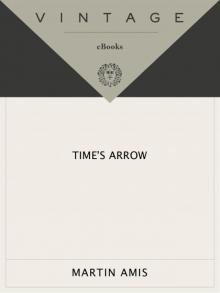 Time's Arrow
Time's Arrow Experience: A Memoir
Experience: A Memoir Einstein's Monsters
Einstein's Monsters The Pregnant Widow
The Pregnant Widow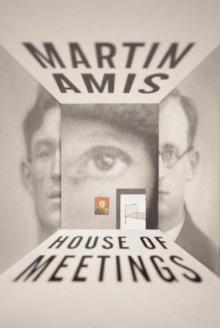 House of Meetings
House of Meetings The Information
The Information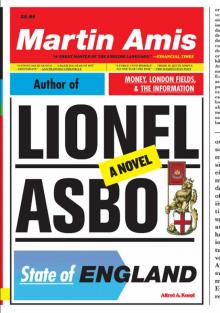 Lionel Asbo: State of England
Lionel Asbo: State of England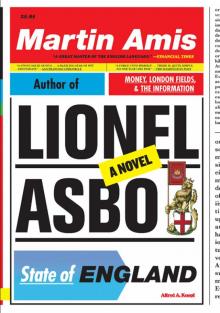 Lionel Asbo
Lionel Asbo Heavy Water and Other Stories
Heavy Water and Other Stories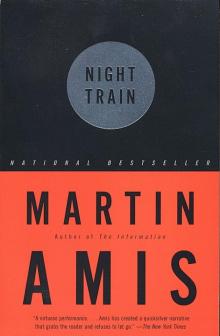 Night Train
Night Train Heavy Water
Heavy Water The War Against Cliche: Essays and Reviews 1971-2000 (Vintage International)
The War Against Cliche: Essays and Reviews 1971-2000 (Vintage International)